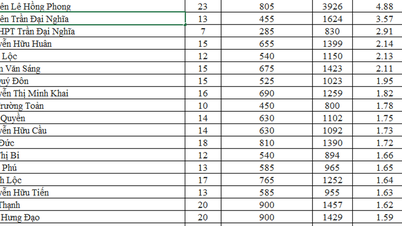The Ministry of Education and Training has just announced a draft Decree regulating preferential allowances according to profession for civil servants and employees in public educational institutions to collect comments according to regulations with a series of new points such as increasing teacher allowances, having allowances for school staff...
Increase teacher allowance
Specifically, the draft adjusts the preferential allowance levels according to the profession of teachers at all levels as follows:
Preschool teachers: Increase allowance from 35% to 45% in favorable areas and to 80% in areas with especially difficult socio-economic conditions, to accurately reflect the complexity and pressure of the work.
Teachers of preparatory schools : Increase allowance from 50% to 70%, equal to teachers of ethnic boarding schools, ensuring fairness for similar tasks.
School staff: First-time allowances added, at 15% for support and service positions (library, clerical, etc.), 20% for shared professional titles (accounting, medical, etc.), and 25% for specialized titles, to recognize their important role.
According to the Ministry of Education and Training, Decision 244/2005/QD-TTg determines the allowance level mainly based on the level of education, type of school and working area (plains and mountainous areas/islands/remote areas). However, the new draft Decree determines the allowance level based on the group of job positions (support, shared expertise, specialized job titles) combined with the level of education, type of school and working area.
The draft also provides more detailed regulations on how to calculate allowances. Specifically, Decision 244/2005/QD-TTg stipulates that allowances are calculated based on salary according to rank, level, plus leadership position allowance, seniority allowance exceeding the framework (if any). The new draft Decree provides more specific calculation methods, including the reserved difference coefficient (if any) and the calculation method for employees who do not receive salary according to the coefficient.

Preschool teachers work the hardest but earn the lowest. (Photo: Hoang Hieu/Vietnam+)
The draft adds regulations on the time not counted for allowances. The new draft Decree clearly lists cases not counted for allowances such as time spent on business trips or studying abroad receiving 40% of salary, time of continuous suspension from work for 1 month or more, time off work receiving social insurance benefits (except for illness and maternity), and other time off exceeding regulations.
The draft Decree supplements detailed regulations on allowances in cases of secondment, receiving multiple types of allowances or multiple levels of allowances in the same Decree (only receiving the highest level), changing the classification of administrative units, working at schools with multiple levels of education, working in inter-schools, teaching at multiple school locations, and non-pedagogical officials participating in teaching at pedagogical schools.
Fix the problems
According to the Ministry of Education and Training, current regulations have contributed to increasing income, ensuring necessary conditions for teachers to fully perform their roles and responsibilities, thereby improving the quality of education. However, in addition to the achieved results, the implementation of preferential allowances according to professions still has some shortcomings.
Specifically, the total income of preschool teachers is not commensurate with the specificity and complexity of their professional activities. Preschool teachers have to care for and educate children from 3 months to 6 years old, requiring high concentration to ensure safety and attract children's attention, often working 9-10 hours/day...
However, their income is the lowest compared to other levels of education (starting salary coefficient 2.10, allowance 35%, total income about 6.63 million VND/month), leading to a high rate of resignation, with 1,600 preschool teachers quitting from August 2023 to April 2024, accounting for 22% of the total number of teachers quitting.
The preferential allowances for teachers of preparatory colleges are not fair compared to those for teachers of ethnic minority boarding schools. Although the complexity of the work is similar (managing and caring for boarding students, organizing activities to preserve and develop ethnic cultural heritage), and the salary scale is the same for each professional title, the preferential allowances for teachers of preparatory colleges and teachers of ethnic minority boarding schools are different. Specifically, teachers of preparatory colleges are 50% and teachers of ethnic minority boarding schools are 70%.

The Ministry of Education and Training said the draft Resolution aims to amend current shortcomings. (Photo: VNA).
The Ministry of Education and Training also said that there are still overlapping and lack of synchronization in the legal document system and inconsistent application between localities. Specifically, the criteria for determining socio-economic regions are still different, causing inadequacies in the application of allowances. Many documents defining mountainous and highland regions have expired but are still used as the basis for paying allowances.
In addition, changes in administrative units over the years (separation, merger) are not updated promptly, causing difficulties in policy implementation. In policy implementation, localities apply different allowance levels due to different understandings of the areas of benefit (for example: the same city teacher but some places pay 35%, other places 50%). Some localities still pay preferential allowances at the old level even though the commune has met the new rural standards and changed areas.
Also according to the Ministry of Education and Training, school staff do not enjoy preferential allowances according to their profession. Currently, most staff positions apply the salary scale of type B or A0 civil servants according to Decree No. 204/2004/ND-CP, which are the two lowest salary scales among the salary scales of cadres, civil servants and public employees.
The positions of laboratory equipment officers, academic affairs officers, and disabled education support officers have only one rank, so there is no opportunity to be promoted to a higher professional title and are subject to a salary scale with a higher starting salary coefficient, a longer salary gap between ranks, and a wider salary range; other staff positions actually have very few opportunities to be promoted.
With the current income level and job requirements, educational institutions find it difficult to recruit full-time staff positions. Staff duties to support teaching and education activities are not complete, timely and of the required quality.
The Ministry of Education and Training said the above shortcomings reduce motivation to stick with the profession, affect the quality of education and the stability of the education sector's human resources, requiring a new regulation to ensure fairness and more effective support.
Therefore, the draft Decree not only overcomes the shortcomings of current regulations but also demonstrates the deep concern of the Party and State for teachers and education staff. The promulgation of the Decree will create a legal corridor for localities to implement policies in a synchronous and fair manner, contributing to improving the quality of education, retaining personnel and promoting the sustainable development of the Vietnamese education sector.
Source: https://phunuvietnam.vn/bo-giao-duc-va-dao-tao-de-xuat-tang-phu-cap-cho-giao-vien-len-toi-da-80-20250513202437319.htm





![[Photo] Prime Minister Pham Minh Chinh chairs conference on anti-smuggling, trade fraud, and counterfeit goods](https://vphoto.vietnam.vn/thumb/1200x675/vietnam/resource/IMAGE/2025/5/14/6cd67667e99e4248b7d4f587fd21e37c)























































































Comment (0)